 Computerworld highlights research by UW CSE Ph.D. student Chloe Kiddon and postdoc Yuriy Brun.
Computerworld highlights research by UW CSE Ph.D. student Chloe Kiddon and postdoc Yuriy Brun.
“As it turns out, identifying humour through software is hard … as the meaning of a sentence will often vary based on the context in which it is presented, and this is something that is difficult to implement in software. When you add humour and puns — when words can have multiple meanings — this can get substantially harder.
“Two researchers at the University of Washington, however, were willing to give it their best shot. In a recently released paper entitled “That’s What She Said: Double Entendre Identification”, Kiddon and Brun describe what they’ve found and introduce their new approach to the problem: ‘Double Entendre via Noun Transfer’ or DEviaNT for short.”
Read the article here. Read the research paper here.
Geekosystem article here. New York magazine here. New Scientist here. ExtremeTech here. Escapist Magazine here. Daily Mail here. Forbes here. Seattle PI here. Seattlest here. Read more →
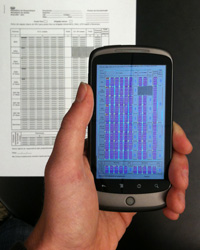 The Bill & Melinda Gates Foundation’s Grand Challenges Explorations program fosters creative projects that show great promise to improve the health of people in the developing world.
The Bill & Melinda Gates Foundation’s Grand Challenges Explorations program fosters creative projects that show great promise to improve the health of people in the developing world.
In the latest round of funding, Allen Wilcox of VillageReach, working with UW CSE’s Nicki Dell, Gaetano Borriello, and Linda Shapiro, received a $100,000 grant for their “Digitizing Paper-Based Data Via Mobile Image Technologies” project.
The team will refine and field test a mobile scanning application to transform paper data into a scalable digital system. Their solution could lower time and cost for data capture, improve data quality from the point of care, and provide access to the same information for all levels in the healthcare delivery system.
This is the second Gates Foundation grant that UW Change members have been involved in. The first was the Mobile Midwives Ultrasound project.
Congratulations to the VilllageReach and UW CSE team!
Puget Sound Business Journal here. VillageReach/UW CSE joint press release here. Read more →
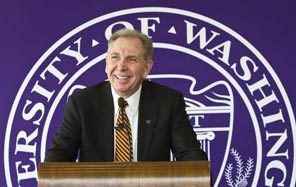 UW CSE is honored that the University of Washington introduced its President-designate, Michael Young, at a press event this morning in the Bill & Melinda Gates Commons of the Paul G. Allen Center for Computer Science & Engineering.
UW CSE is honored that the University of Washington introduced its President-designate, Michael Young, at a press event this morning in the Bill & Melinda Gates Commons of the Paul G. Allen Center for Computer Science & Engineering.
UW CSE’s Ed Lazowska is quoted in this KOMO-TV story: “This is like any organization. The leadership comes from the top. The tone comes from the top. So having someone with tremendous academic achievement, which he has; tremendous leadership experience; entrepreneurial experience as well; it’s a huge win.”
Impressively, Young – currently the President of the University of Utah – was able to recite a detailed list of Utah’s legendary contributions to computer graphics – the people, the companies, the technologies. He also claimed to have seen Chris Johnson on two separate occasions when Chris wasn’t wearing shorts – a claim that we find suspicious.
From the Seattle Times: “His staff at the University of Utah gave him a set of UW cufflinks, and the UW gave him a goody bag with Husky paraphernalia, including a yo-yo that lights up, from the Department of Computer Science & Engineering, where the news conference was held.” Read more →
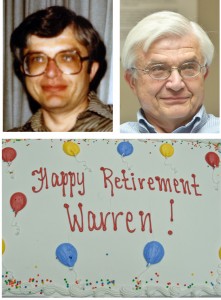 After more than 30 years as a UW CSE graduate student and staff member (mostly as a staff member – he’s not one of those!), Warren Jessop has retired!
After more than 30 years as a UW CSE graduate student and staff member (mostly as a staff member – he’s not one of those!), Warren Jessop has retired!
In announcing Warren’s retirement, Erik Lundberg, CSE’s Laboratory Director, said: “Not many of you were around when Warren joined the department as a graduate student in the early 1980s. Starting in 1982, he worked for the VLSI Consortium for a number of years, and later joined the CSE Lab staff to provide broader departmental support for Sun workstations. In 1999, he took over the management of the Lab’s Support Group, which at the time he termed “grabbing the Third Rail of the Lab.” Indeed. But Warren has created a high-functioning operation, which keeps the trains running on time and the services humming. We are sad to see him leave.”
See some wonderful Bruce Hemingway photos here. Read more →
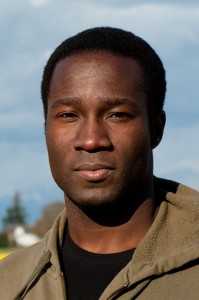 CSE Ph.D. student Yaw Anokwa has been named the 2011 recipient of the University of Washington Graduate School Medal.
CSE Ph.D. student Yaw Anokwa has been named the 2011 recipient of the University of Washington Graduate School Medal.
The Graduate School Medal is awarded annually to a PhD, DMA, AuD, DNP, DPT, or EdD candidate who displays an exemplary commitment to both the University and its larger community. The Graduate School Medal recognizes the “scholar-citizens” whose academic expertise and social awareness are integrated in a way that demonstrates active civic engagement and a capacity to promote political, cultural and social change.
Yaw, advised by Gaetano Borriello and Tapan Parikh, builds technologies for low income regions and runs the change group at UW. His current project is Open Data Kit.
Yaw is the third CSE recipient of the Graduate School Medal: the 2010 medal was won by Anna Cavender (now at Google), and the 2004 medal by Vibha Sazawal (now at the University of Maryland).
Congratulations Yaw! Read more →
 Corensic, founded by UW CSE faculty members Luis Ceze and Mark Oskin, has been named a 2011 “Cool Vendor in Application Development” by the Gartner Group.
Corensic, founded by UW CSE faculty members Luis Ceze and Mark Oskin, has been named a 2011 “Cool Vendor in Application Development” by the Gartner Group.
Corensic’s mission is to deliver tools that enable software developers and software development organizations to build higher quality software, by exposing concurrency errors. Read more →

NRC "Data-Based Assessment of Research-Doctorate Programs"
On April 21, NRC revised certain aspects of its disastrously flawed “Data-Based Assessment of Research-Doctorate Programs in the United States,” admitting to a broad range of errors. It’s still a shameful bust. In the words of the Computing Research Association:
The NRC has released “revised” rankings for Ph.D. programs. However, this “revision” does not address any of the substantive issues with both the data collection and the ranking methodology that have been raised by CRA and other organizations. This is regrettable. Accordingly our view must still stand: CRA does not consider the purported rankings that have been released by the NRC to be an accurate reflection of computing program strengths, will not use them in any of our activities and urges others interested in the field of computing to ignore them as well.
Read it and weep. And while you’re at it, read this article from the Chronicle of Higher Education by Jonathan R. Cole, University Professor and former Provost at Columbia University:
After more than seven years trying to improve the quality of the data in the recent study, I was alone in refusing to sign off on it. Rather than write a dissent, which would have further delayed an already late report, I resigned from the committee before the assessment’s publication. The report’s quality was not worthy of publication, nor, I believe, did it live up to the standards that the National Academy of Sciences, which sponsored it, should set. Read more →
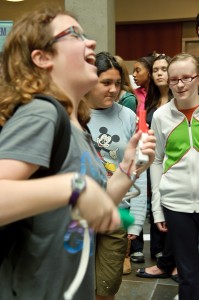 Nearly 4,000 K-12 students visited the University of Washington for Engineering Discovery Days, April 22-23. And at times it seemed as if they were all simultaneously crammed into the Microsoft Atrium of the Paul G. Allen Center for Computer Science & Engineering. See Bruce Hemingway’s photos here. Read more →
Nearly 4,000 K-12 students visited the University of Washington for Engineering Discovery Days, April 22-23. And at times it seemed as if they were all simultaneously crammed into the Microsoft Atrium of the Paul G. Allen Center for Computer Science & Engineering. See Bruce Hemingway’s photos here. Read more →
 Urbandipity is a Seattle social networking startup that “enables you to find [real-world] serendipity more often.” It was launched by four long-time friends, including UW CSE 2007 alum Dustin Conrad. Read the GeekWire profile here. Read more →
Urbandipity is a Seattle social networking startup that “enables you to find [real-world] serendipity more often.” It was launched by four long-time friends, including UW CSE 2007 alum Dustin Conrad. Read the GeekWire profile here. Read more →
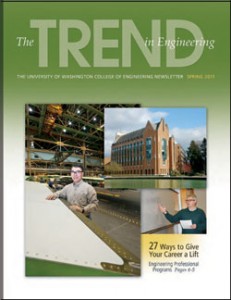 Yeah, it’s a house organ, but we’ll take whatever coverage we can get …
Yeah, it’s a house organ, but we’ll take whatever coverage we can get …







